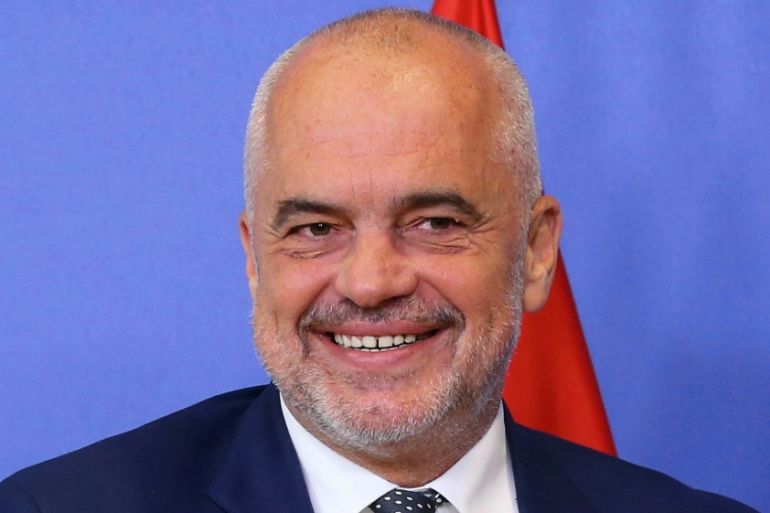Albanian parliament censures president for cancelling local polls
PM Edi Rama vows to go ahead with local government elections on June 30, calling President Ilir Meta’s action ‘insane’.

Tirana, Albania – A parliamentary resolution approved by 100 votes to seven has censured Albania’s President Ilir Meta for cancelling nationwide local elections, scheduled for June 30.
“The constitution and electoral law do not allow the president to cancel the election,” the resolution passed on Thursday said, calling Meta’s action “unprecedented” and accusing him of “denying the right of Albanians to elect their representatives”.
Meta had asked the ruling Socialist Party and the opposition Democratic Party to compromise on an alternative date for the elections to the country’s 61 mayoral districts.
The Democratic Party, which withdrew its MPs from parliament in February, said it won’t participate in the mayoral elections, while the Socialist Party insisted on contesting them.
Meta said this effectively disenfranchised half the country’s population. “Under the current conditions, the annulment of elections is the only urgent remedy for solving the severe political crisis and preventing its uncontrolled escalation,” he wrote on June 8.
“Postponing to another date, agreed between the political parties, will serve as an incentive for dialogue on crisis resolution that is threatening the democratic stability of the country.”
Prime Minister Edi Rama called Meta’s decision “insane” in a stinging rebuke delivered in the legislature, and accused him of abusing his office by picking political sides.
“What more does Meta want,” Rama asked. “Hasn’t Albania honoured him enough? … He owes the country rivers, oceans of gratitude… he is spoiled.”
Meta’s legal adviser said only the Constitutional Court could settle the dispute over the president’s authority to set the date for an election. But the court has been defunct for 18 months as its judges submit to an investigation into their finances.
However, opposition Democratic Party leader Lulzim Basha said the president’s word was final. “There are no elections on June 30,” he told Al Jazeera after the parliamentary vote.
“Whatever process is being planned by people who should have been behind bars for offences as grave as drug trafficking and women trafficking, but instead are running for mayor or are running campaigns on behalf of Mr Rama’s group … it does not resemble elections formally, substantially and definitely not constitutionally,” Basha said.
Basha also warned that if the government proceeded with the vote, it would be “tantamount to a coup d’etat, and the political opposition will call upon the people of Albania to do nothing less and nothing more than what civilised western societies would do in similar conditions.” He did not elaborate.
Basha has until now called upon opposition voters, who garnered 48 percent of the nationwide vote in 2017 general elections, to abstain from voting.
Meanwhile, Socialist Party members are confident of holding the elections. “There are 5,000 ballot boxes. What are the Democrats going to do? They can obstruct voting in one or two or three voting centres. They cannot do it nationwide,” said a senior Socialist Party official on condition of anonymity.
EU membership talks
The worsening political crisis came as Albania braces for a greater disappointment, with the European Union (EU) leaders almost certain not to invite the country for membership talks that were scheduled to conclude in the next six years.
On Wednesday, the Dutch parliament voted against an invitation to Albania, while German Chancellor Angela Merkel told a Bundestag committee earlier this month that the country could only be invited in October at the earliest.
Rama appeared to foist the blame on his political opponents. “The opposition wants to portray Albania as a country that has risen up against a narco-state, and it doesn’t want Albania to catch the train in 2025 [to EU entry],” he told the parliament.
But even reports by the European Commission (EC), which is eager to open talks, have pointed out serious concerns with Albania’s lack of progress in cracking down on organised drug crime, enforcing rule of law, and establishing an independent judiciary.
“In the fight against criminal organisations and structured criminal groups … the number of indictments and final convictions remains very low,” the latest EC report said. “The fight against corruption … continues to require further structured and consistent efforts.”
Political upheavals are not new in Albania. In 2013, when Rama was Tirana’s mayor and a Socialist Party leader, he withdrew party MPs from the legislature in protest against the shooting of four demonstrators outside then-Prime Minister Sali Berisha’s office.
Basha, who was disgraced as the interior minister at that time, is now using Rama’s tactics against him.
Rama, in turn, may suspect Meta of preparing to overthrow him since the president has often acted as a political kingmaker. In 2005, Meta broke with the Socialist Party and founded the Socialist Movement for Integration (LSI).
Meta then helped form a coalition government led by the Democratic Party in 2009, and switched sides again to support a Socialist-led coalition government in 2013. Even though Meta broke formal ties with the LSI after he became the president, it is currently led by his wife, Monika Kryemadhi.
Internecine politics aside, the pursuit of an EU membership is a goal an overwhelming majority of Albanians support. The leader who convinces voters of being able to achieve that is likely to garner most support.
|
|